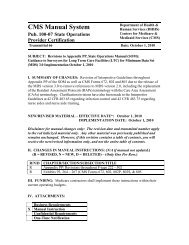LOUISIANA Community Mental Health Services Block Grant ...
LOUISIANA Community Mental Health Services Block Grant ...
LOUISIANA Community Mental Health Services Block Grant ...
You also want an ePaper? Increase the reach of your titles
YUMPU automatically turns print PDFs into web optimized ePapers that Google loves.
Although the CMHC‟s operate with somewhat traditional hours, crisis services are provided on a<br />
24-hour basis. These services are designed to provide a quick and appropriate response to<br />
individuals who are experiencing acute distress. <strong>Services</strong> include telephone counseling and<br />
referrals, face-to-face screening and assessment, community housing for stabilization, crisis respite<br />
in some areas, and access to inpatient care.<br />
The <strong>Mental</strong> <strong>Health</strong> Rehabilitation (MHR) program continues to provide services in the community<br />
to adults with serious mental illness and to youth with emotional and behavioral disorders. As of<br />
July 1, 2009, the oversight and management of the MHR program was transferred to the Bureau of<br />
<strong>Health</strong> <strong>Services</strong> Financing (Medicaid) within DHH. All staff, equipment, materials, contracts,<br />
purchase orders, processes and personnel were transferred. Starting on that date, Medicaid began to<br />
provide all utilization management, prior authorization, training, monitoring, network, and member<br />
service activities.<br />
During the just ended fiscal year, the MHR program continued to refine its operation, oversight and<br />
management activities to align itself with industry standard Administrative Service Organization<br />
functions, including Member <strong>Services</strong>, Quality Management, Network <strong>Services</strong> (Development and<br />
Management), Service Access and Authorization, as well as Administrative Support and<br />
Organization.<br />
Efforts to improve the <strong>Mental</strong> <strong>Health</strong> Rehabilitation optional Medicaid program continued through<br />
FY 2009 -2010. Continued collaboration with the Office for <strong>Community</strong> <strong>Services</strong> (OCS) and the<br />
Office of Juvenile Justice (OJJ) resulted additional staff trainings and pilot projects across the state<br />
to increase access to medically necessary mental health services for eligible adults and children<br />
served by those agencies. The MHR program and newly formed Medicaid Behavioral <strong>Health</strong><br />
Section also participated in and led several Coordinated Systems of Care planning efforts, in<br />
collaboration with OCS, OJJ, OBH, DOE, as well as family members, advocates, and other invested<br />
stakeholders. Additional policies and procedures governing the processes of certification and<br />
recertification were refined, as were policies and procedures related to complaints, grievances and<br />
events.. The MHR program continued to add new MHR providers during the year, and a number of<br />
new Multisystemic Therapy (MST) providers were also certified by Medicaid during the year..<br />
During FY 09-10, as of the date of this summary, nine additional MHR providers have enrolled,<br />
expanding the network of qualified providers to 69. The total number of MHR recipients served has<br />
continued to increase accordingly, resulting in approximately 9,632 unduplicated recipients having<br />
been served during the fiscal year. Medicaid added 11 new MST providers during the fiscal year,<br />
resulting in 22 MST providers enrolled, including 32 MST teams. During the fiscal year, 1364<br />
youth were served in MST throughout the state.<br />
Beginning June 2010, the MHR program began statewide implementation of its new Provider<br />
Performance Indicator reviews. The Clinical Documentation/Utilization Management Monitoring<br />
module (covering screening, initial assessments, reassessments, initial and ongoing treatment<br />
planning, crisis planning, discharge planning and service delivery domains) and its Covered<br />
<strong>Services</strong> Module (monitoring Assessment and Service Planning, <strong>Community</strong> Support, Counseling,<br />
Individual, Group and Family Interventions, as well as Psychosocial Skills Training and<br />
Parent/Family Interventions) were implemented. Results will be used for Provider Report Cards, as<br />
well as referrals for possible Notices of deficiencies, provider training and education referrals, and<br />
as focused monitoring tools for complaints, grievances, etc. In addition, enhancements to the<br />
Behavioral <strong>Health</strong> Section‟s website included more service and referral information for<br />
PART C <strong>LOUISIANA</strong> FY 2011 PAGE 103<br />
SECTION III: ADULT PLAN – CRITERION 1<br />
COMPREHENSIVE COMMUNITY-BASED MENTAL HEALTH SERVICES -- SYSTEM OF CARE & AVAILABLE SERVICES
















